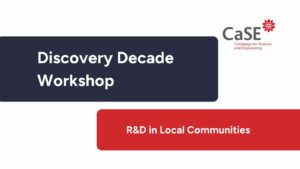R&D in local communities
30 Nov 2022
Participants
- Anglia Ruskin University
- Peterborough
- Francis Crick Institute
- Imperial College London
- MSD
- Wellcome Connecting Science, Wellcome Genome Campus
Key Conclusions
- New and expanding R&D institutions should focus on the career opportunities they are creating, including any industry relationships and apprenticeship pathways. Our workshop reinforced that tangible and accessible job opportunities are a powerful motivator of support, especially when communicated to parents and young people via local schools.
- Institutions should increase their use of messages and messengers that are relevant to their audiences. Relating the institution’s work back to the local area and local issues, recognising the experience of residents and understanding what language resonates will help keep messaging relatable. Broadening the pool of messengers will demonstrate the diversity of research careers available.
- Conversations with local communities should be ongoing, upfront and honest. Accommodating a new or expanded institute in an area requires patience and willingness on both sides. The institute needs to recognise any preconceptions the public may have and address these head-on; being overly positive can unintentionally harden scepticism

R&D in local communities
Download ReportRelated resources

Rebecca Hill reflects on Public Attitudes to Science 2025, a study from UK Research and Innovation and the British Science Association, and how it relates to CaSE’s own public opinion research.

This briefing summarises public attitudes to R&D and businesses. It is based on evidence from extensive quantitative and qualitative research carried out by CaSE since 2022.

This briefing summarises public attitudes to R&D and universities. It is based on evidence from extensive quantitative and qualitative research carried out by CaSE since 2022.

This briefing summarises public attitudes to R&D and government and politicians. It is based on evidence from extensive quantitative and qualitative research carried out by CaSE since 2022.